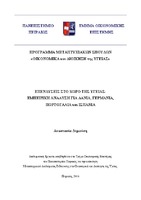Επενδύσεις στο χώρο της υγείας : εμπειρική ανάλυση για Δανία, Γερμανία, Πορτογαλία και Ισπανία
Investments in health care : an empirical analysis for Denmark, Germany, Portugal and Spain

Προβολή/
Λέξεις κλειδιά
Υγεία ; Επενδύσεις ; Δανία ; Γερμανία ; Πορτογαλία ; Ισπανία ; Healthcare ; Investments ; Denmark ; Germany ; Portugal ; SpainΠερίληψη
Ο τομέας της υγείας αποτελεί έναν από τους σημαντικότερους και κυριότερους τομείς
των δημοσίων δαπανών, αντιπροσωπεύοντας σχεδόν το 15% του συνόλου των
κρατικών δαπανών στην Ευρωπαϊκή Ένωση (Ε.Ε.), το 8% του συνολικού
ευρωπαϊκού εργατικού δυναμικού και το 10% του ΑΕΠ της Ε.Ε. Ο τομέας είναι
ζωτικής σημασίας για τη διασφάλιση της υγείας και της ευημερίας των πληθυσμών
της Ευροζώνης, ενώ βρίσκεται στον πυρήνα της υψηλού επιπέδου κοινωνικής
προστασίας της Ε.Ε. Τα θέματα υγείας έχουν αποκτήσει εξέχουσα θέση, τα τελευταία
χρόνια, στο πλαίσιο των συζητήσεων για τις δημόσιες δαπάνες και για τα κατάλληλα
επίπεδα κοινωνικής προστασίας κατά τη διάρκεια της οικονομικής κρίσης. Παρ 'όλα
αυτά, οι πιέσεις για μεταρρύθμιση των εθνικών συστημάτων υγείας που χτίζονταν
μέχρι και πριν από την οικονομική κρίση πλέον έχουν βγει ενεργά στο προσκήνιο.
Πέρα από την οικονομική κρίση, οι πιέσεις αυτές συνδέονται με τη γήρανση του
πληθυσμού, την επιβάρυνση από χρόνιες παθήσεις, το κόστος των νέων τεχνολογιών,
και μια συνολική αύξηση της ζήτησης για υγειονομική περίθαλψη. Στις προκλήσεις
αυτές τα συστήματα υγείας κάθε χώρας ανάλογα με το κοινωνικοοικονομικό
περιβάλλον και τις συνθήκες στις οποίες αναπτύχθηκαν ανταποκρίνονται διαφορετικά
και διαφορετικά χαράσσουν τις στρατηγικές επενδύσεων στον τομέα της υγείας. Η
παρούσα μελέτη εξετάζει τις επενδύσεις στην υγεία για τέσσερα διαφορετικά κράτη-
μέλη της Ε.Ε., τη Δανία, τη Γερμανία, την Πορτογαλία και την Ισπανία, όπως αυτές
αποκρυσταλλώνονται στα προγράμματα χρηματοδότησης των Ευρωπαϊκών
Διαρθρωτικών Ταμείων την προηγούμενη προγραμματική περίοδο (2007-2013), αλλά
και την τρέχουσα (2014-2020). Από την εμπειρική ανάλυση συμπεραίνουμε ότι
παρότι υπάρχουν κοινές κατευθυντήριες γραμμές στην Ε.Ε. για τον τομέα της υγείας,
κάθε χώρα επενδύει σε διαφορετικούς τρόπους και μεθόδους για να οδηγηθεί προς
τους επιδιωκόμενους στόχους.


